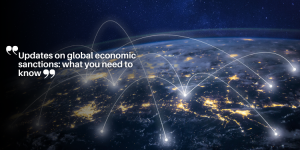Breaking news on global economic trends: what you need to know

The future outlook on global economies is shaped by technology, sustainability efforts, global relations, and demographic shifts, all of which significantly influence market trends and opportunities for growth.
Breaking news on global economic trends can reshape the way we view our finances and investments. Have you ever wondered how these shifts impact your wallet? Let’s dive into the latest updates that could affect your future.
Current global economic shifts
In 2023, the current global economic shifts have become a topic of great concern and interest. Across the world, economies are responding to various pressures that affect international trade, employment rates, and consumer behavior. Understanding these shifts can help us make informed decisions in our personal and professional lives.
One major area of focus is inflation, which has been rising in many countries. Higher prices for goods and services can impact how people budget their money. For instance, individuals are spending more on essentials, forcing some to adjust their lifestyle choices. As inflation continues, many are wondering how it will affect economic growth in the long run.
Key Factors Influencing Economic Shifts
Several factors contribute to the current shifts in the global economy. Here are just a few:
- Changes in international trade agreements
- The ongoing impact of the COVID-19 pandemic
- Technological advancements
- Environmental changes and policies
Amid these changes, it’s essential to consider how governments and businesses adapt. Some countries are adjusting their policies to promote growth, while others are facing challenges that slow down their progress. The balance between maintaining economic stability and driving growth is delicate and requires careful planning.
In addition to these factors, consumer confidence plays a significant role in shaping economic conditions. When people feel optimistic about their financial situations, they are more likely to spend money, which boosts the economy. On the other hand, uncertainty can lead to decreased spending, impacting overall economic health.
Regional Impacts of Economic Changes
The impact of these global economic shifts can vary widely by region. For example, developing economies may face unique challenges compared to established economies. In some regions, growth may accelerate due to increased demand for local products, while in others, reliance on imports may hinder development.
- Developed countries may face higher costs due to supply chain issues.
- Emerging markets may benefit from increased foreign investment.
- Regional trade agreements could reshape markets.
As we navigate these current global economic shifts, it becomes clear that staying informed is crucial. This understanding allows individuals and businesses to prepare for potential hurdles and take advantage of new opportunities. With the right strategies, we can adapt to these changes and emerge stronger.
Key factors driving economic trends
Understanding the key factors driving economic trends is essential for anyone wanting to stay ahead in today’s ever-changing landscape. These factors not only influence how economies grow but also how individuals and businesses make decisions.
One crucial factor is the impact of **technology**. With rapid advancements, new tools and platforms change the way businesses operate. For example, companies are embracing automation to enhance productivity. This shift can lead to greater output but also raises questions about job displacement.
Government Policies and Regulations
Government actions significantly influence economic trends. Changes in tax policies can alter spending and investment behaviors. Here are a few areas to consider:
- Tax incentives that encourage business investment.
- Trade agreements that influence export and import levels.
- Subsidies aimed at promoting certain industries.
Another important aspect is **consumer behavior**. When people feel secure in their jobs and finances, they tend to spend more. This increased spending supports businesses and can stimulate broader economic growth. Conversely, during uncertain times, consumers may cut back on expenditures, leading to slower growth.
Global Economic Conditions
Economic trends are also shaped by global events. A crisis in one country can have ripple effects worldwide. For instance, the COVID-19 pandemic disrupted supply chains, leading to global shortages and economic slowdowns. Additionally, fluctuations in international oil prices can affect fuel costs and, in turn, the prices of goods.
Another factor to examine is demographic changes. An aging population can influence labor markets and healthcare needs. Moreover, migration patterns can shift labor availability and spending habits. These demographic shifts play a significant role in driving economic trends.
In conclusion, by focusing on these key factors driving economic trends, individuals and businesses can better navigate the complexities of the modern economic landscape. Awareness of these influences enables informed decision-making, whether it’s in investment, spending, or policy advocacy.

Regional impacts and implications
The regional impacts and implications of global economic trends can be profound and varied. Different areas may experience unique challenges and opportunities based on their economic structure, resources, and demographics. Understanding these regional dynamics is crucial for policymakers and businesses alike.
For instance, emerging markets often have the potential for rapid growth due to expanding middle classes. As disposable income increases, consumer spending rises, which can boost local businesses. However, these nations also face hurdles such as infrastructure deficits and political instability.
Challenges in Developed Regions
In contrast, developed regions may experience slower growth rates. High levels of debt and aging populations can hinder economic expansion. Here are some key challenges:
- High unemployment rates in certain sectors.
- Stagnating wages that can limit consumer spending.
- Increased regulation that may stifle innovation.
Meanwhile, cities with diverse economies can be more resilient to economic shocks. For example, urban areas with robust tech sectors might attract talent and investment, contrasting with regions heavily reliant on traditional industries, which may struggle.
Geopolitical Factors
The geopolitical landscape also plays a significant role in shaping regional economic conditions. Trade agreements can enhance or restrict access to international markets. For example, a new trade deal might provide local businesses with opportunities to export goods more easily. Conversely, tariffs and trade conflicts can have detrimental effects, leading to higher prices for consumers and slowing down economic growth.
Additionally, environmental factors are increasingly critical. Regions prone to natural disasters may face severe economic disruptions. For instance, hurricanes and wildfires can damage infrastructure and displace communities, resulting in costly recovery efforts.
Ultimately, the regional impacts and implications of economic trends vary widely and require tailored responses. Local governments and businesses must remain adaptable and informed to navigate these changing landscapes effectively.
Future outlook on global economies
The future outlook on global economies is filled with both opportunities and challenges. As nations adapt to shifting dynamics, understanding potential trends is key for businesses and individuals alike. Various factors will shape this outlook, including technological advances, demographic changes, and environmental considerations.
One significant aspect is the rise of **digital economies**. More businesses are shifting online, and this trend is likely to continue. E-commerce allows companies to reach global markets without the infrastructure costs of physical stores. This shift encourages innovation and creates new job opportunities. However, it also raises questions about data privacy and security.
Impact of Climate Change
Climate change is another crucial factor affecting economic forecasts. As natural disasters become more frequent, businesses may face disruptions. Here are some implications to consider:
- Increased costs for insurance and disaster recovery.
- Shifts in agricultural productivity due to changing weather patterns.
- Investment in green technologies and renewable energy sources.
This transition to sustainability is not just an environmental concern; it’s becoming an economic necessity. Many companies are adopting sustainable practices, which can attract eco-conscious consumers and investors.
Global Relations and Trade
The future of global economies is also tied to international relations and trade agreements. Political stability can foster trade, while tensions can lead to tariffs and restrictions, disrupting markets. For example, changing trade policies can impact supply chains, making some goods more expensive and affecting consumer behavior.
Moreover, global demographics will play a crucial role in shaping economic conditions. The aging population in many developed countries may strain healthcare systems and pension funds. Meanwhile, younger populations in developing nations may lead to a labor surplus, potentially impacting wage levels and migration patterns.
In summary, staying informed about the future outlook on global economies will be essential. Understanding these dynamics can help businesses and individuals prepare for upcoming changes and seize opportunities in a rapidly evolving world.
In conclusion, the future of global economies holds both challenges and opportunities. Understanding the key factors that shape economic trends, such as technology, sustainability, and global relations, is important for individuals and businesses alike. By staying informed and adaptable, everyone can navigate these changes and make wise decisions. Embracing innovation and sustainability will be crucial for growth, while awareness of international dynamics will help mitigate risks. As we look ahead, being proactive will enable us to seize the opportunities that arise in this evolving landscape.
FAQ – Frequently Asked Questions about Global Economic Trends
What are the key factors driving economic trends?
Key factors include technology advancements, government policies, consumer behavior, and global relations that impact trade and economics.
How does climate change affect economies?
Climate change can disrupt markets through increased costs for recovery, affecting agriculture and prompting investments in green technologies.
Why is it important to monitor global relations?
Global relations significantly influence trade agreements and tariffs, which can directly affect market access and economic growth.
How can businesses prepare for demographic changes?
Businesses should analyze shifting demographics to understand how to adapt their products and strategies to meet evolving consumer needs.







